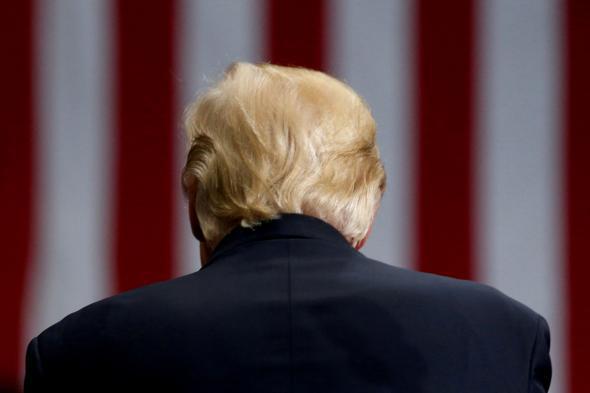
Jonathan Ernst/Reuters
In the tradition of the Clintonometer and the Trump Apocalypse Watch, the Impeach-O-Meter is a wildly subjective and speculative daily estimate of the likelihood that Donald Trump leaves office before his term ends, whether by being impeached (and convicted) or by resigning under threat of same.
The Daily Beast has tracked down a Twitter user calling herself “Nicole Mincey” who was recently retweeted by the president.
The “Nicole Mincey” Twitter account was subsequently disabled, and the Beast reporter discovered that the account was the work of a New Jersey college student who appears to have created a network of fake identities for the purpose of operating a low-grade right-wing blog and knockoff Trump merchandise store. It was an endeavor that was as elaborate as it was transparently bogus—the photo of “Mincey” on her Twitter account was a stock photo that was easily identifiable as such, for example.
This, of course, isn’t the first time the president has amplified a dubious social media account in an attempt to create the impression that he is backed by a groundswell of popular support. He hasn’t deleted his tweet, so it still appears on his timeline as if he were responding to a grassroots supporter. (Of course, in a way, he was; it’s not coincidental that someone whose idea of entrepreneurship is selling knockoff merchandise via fake accounts on a barely coherent agitprop blog would be drawn to the president who invented “Trump University.”)
The Mincey affair and the Trump campaign/White House’s broader willingness to cultivate and benefit from phony material online bring to mind the oft-deployed political epithet Orwellian and the concept of doublethink, explained in 1984 as the ability to believe anything, no matter how obviously it conflicts with reality, with total conviction. In 1984, governance via doublethink was terrifyingly all-encompassing and effective. Big Brother’s approval ratings were tremendous! Mincey’s story, by contrast, illustrates the Trump version of doublethink, which also involves defending indefensible premises—but only for as long as it takes to achieve short-term gratification by confounding an enemy or conning some low-information customer/victim out of their money or vote. It was obvious to most observers that there was something off about Mincey’s account; still, “she” served a short-term function for Trump, like the plant at a high-pressure time-share sales event who stands up and says he can’t wait to jump on these friggin’ great deals.
Elsewhere on Tuesday, U.N. ambassador Nikki Haley condemned a Fox News story about North Korea because it included information leaked anonymously to a reporter. The idea that “leaks” are an urgent threat to national security has been a theme of the administration’s lately, so Haley probably thought she was doing her boss’s bidding by calling the story “incredibly dangerous” and suggesting it constituted “playing with people’s lives.” The problem: President Trump liked Fox’s story, because it justified his administration’s tough rhetoric and had been distributed by the Twitter account of his favorite show, Fox and Friends. He had actually tweeted it approvingly before Haley’s remarks:

Screen shot/Twitter
Haley had internalized the idea that leaks put American lives in danger only to find out that today, leaks are good. It’s a doublethink distinction so arbitrary, in other words, that even Trump’s own hack couldn’t figure it out.
A similar example of instant bullshit failure was described in a Tuesday New York Times–ProPublica report about the White House’s obfuscation of the identities of the individuals who are working on the president’s federal deregulation intiatives. The piece includes this glittering gem of an exchange:
The Justice Department has released the names of only two appointees currently working on its team. In an email exchange, a spokesman, Ian Prior, said he could not provide additional names because “the Task Force is made up of components, not particular employees.”
“A component may have multiple employees assisting with the work,” he added.
Asked if he could name any of those employees, he responded, “Decline.”
Ah, yes, the classic components-employees distinction—an obfuscatory ruse so ingenious that no reporter could penetrate it, except by asking a simple follow-up question. Trump doublethink may have its uses, but it’s not built to last.

Photo illustration by Natalie Matthews-Ramo. Photos by Chip Somodevilla/Getty Images, Win McNamee/Getty Images, Chris Kleponis-Pool/Getty Images, Drew Angerer/Getty Images, and Peter Parks-Pool/Getty Images.